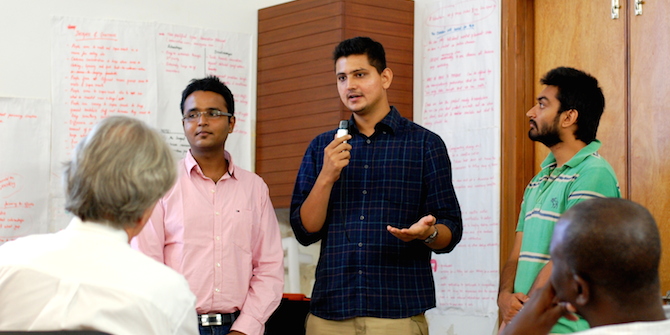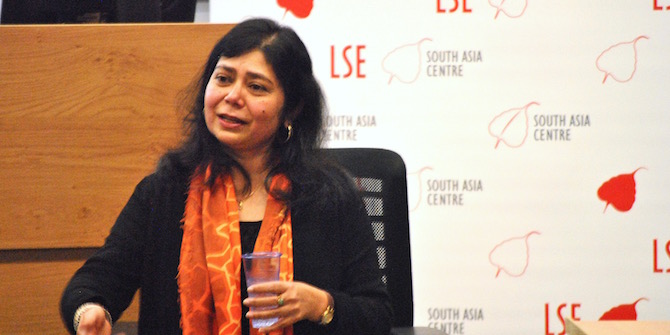 During a recent visit to LSE, Shri Prafull Anubhai, LSE alumnus and Chairman of the Board of Management at Ahmedabad University, was interviewed by Sonali Campion. In part 1 of the interview he talks about the demographic challenges facing India’s higher education institutions and how Indian undergraduate degree courses should be made more broad-based in order to be applicable to the real world.
During a recent visit to LSE, Shri Prafull Anubhai, LSE alumnus and Chairman of the Board of Management at Ahmedabad University, was interviewed by Sonali Campion. In part 1 of the interview he talks about the demographic challenges facing India’s higher education institutions and how Indian undergraduate degree courses should be made more broad-based in order to be applicable to the real world.
With a third of the population under the age of 15 and half under 24 there is concern that educational institutions aren’t going to be able to handle the demand in coming years. What is your view on this?
The question is – what do we do with them? How do we make them major agents of change for the development of the country? That’s the big challenge, and that is where education plays a huge role. That is where I think we need to do far more than what we are doing today.
I call the current situation “demographic opportunity”. We have to convert that opportunity into dividend, and that is what the challenge before education is. So, we need to improve the quality of education, which is very important. My sense is that, aside from a handful of institutions, the general level can be improved a great deal more.
The Indian education system has two major shortcomings as of now. One, the students specialise too much and too early. Education is not broad-based, and if you specialise too much and too early you tend to develop a narrow vision. Problems in life do not come discipline-wise, they have all facets, which create problems for people who come with this kind of specialisation. This is one issue. The second issue is that academic institutions and the real world i.e. the practicing world, have very little connection. This again is a huge shortcoming because the students do not understand as to what real life is all about. So when they step out of the university, instead of being ready to contribute something they are lost for the first few years. The industry and other organisations have to spend quite a lot of time to make them ready, or sensitise them to the reality of life. We are trying to address these issues about our education.
So do you think there needs to be a more vocational element in higher education, to make people work-ready?
I see it somewhat differently. I do not see it in terms of skills to be developed, which are immediately applicable. I see it more in terms of the attitude and the awareness that they need to cultivate to interpret the real world.
Take designing education for engineering students – I’ll give you this as an illustration. I find that engineering education needs three pillars: one is what I call feasibility, engineering skills by which they can solve a problem. Now for this they require STEM subjects: science, technology, engineering and mathematics. But that’s not enough. Engineering students need to be aware about viability. Which requires an understanding of economics, finance, accounting, and management. But even that is not enough. They need to know about the desirability of this solution that they come up with. What it does to the environment, what it does to pollution, what is does to climate change, what it does to gender bias, and what it does to generation transfers. These are issues which they also need to understand.
So when you approach engineering education, and you design curriculum, you have to keep all this in mind. This terminology which I am using, these three pillars, is something which has been defined by Olin College. That is where I saw all this happening and I thought it very relevant to Indian Education.

That also ties in with the recent debate of three-year versus four-year courses – do you think there is something to be said for adopting the four-year liberal arts style course?
Yes, in fact I am convinced about one thing: in the Indian context we need to have a 4-year programme. The first year or year and a half must be the base – arts and sciences. After that students should specialise. And there should be, in my view, one undergraduate programme. Then students can branch off. That’s what we are working towards achieving in the next few years. There is a wider opinion to be built around this; for the parents, for the students, for the faculty and so on. It poses quite a few challenges – how to integrate this ? There are a number of institutions that have tried to do this. They introduced some courses in humanities, for example in engineering education. What is not happening is integration of all this.
I’ll give you another illustration. An anthropologist in an engineering school. Again I go back to Olin, but it is an impressive example. I met an anthropologist there. She did not teach anthropology the way in which they would in a social science programme. She taught a course called “Aging Adults” and brought in 40 senior people from the community and paired them with the students for the course. And the students began to understand what kind of challenges the seniors face, and how they can provide engineering solutions. Now, an anthropologist offering this kind of a course –this is what I mean by integration and not just teaching a course about anthropology, which has no relation to the engineering courses.
It sounds like a much more organic way of learning.
Exactly, that is exactly the point.
Look out for part 2 of the interview, to be published next week.
About the Authors
 Prafull Anubhai is Chairman of the Board of Management (equivalent to President) at Ahmedabad University. He is a member of the Governing Council of the Ahmedabad Education Society. He is also a member on the Board of Directors of Centre for the Science Technology and Policy and a Trustee of Sri Aurobindo College of Commerce and Management, Ludhiana. In addition, he has been associated with IIMA for the more than 40 years as faculty and is on the Board of Governors.
Prafull Anubhai is Chairman of the Board of Management (equivalent to President) at Ahmedabad University. He is a member of the Governing Council of the Ahmedabad Education Society. He is also a member on the Board of Directors of Centre for the Science Technology and Policy and a Trustee of Sri Aurobindo College of Commerce and Management, Ludhiana. In addition, he has been associated with IIMA for the more than 40 years as faculty and is on the Board of Governors.









i believe , this discussion will change future of education system in respect with environment.